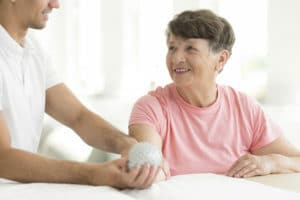
Strokes: a Global Concern
Reportedly, the World Health Organization estimates some 15 million people suffer strokes during any given year. This condition causes more than 140,000 fatalities annually in the United States alone. It serves as the leading cause of serious long term disability in the U.S. population.(1)
A stroke occurs when something, such as a sudden blood clot or the rupture of a blood vessel, impedes the flow of blood reaching the brain.(2) Stroke impacts may vary widely based upon the areas of the body affected by the disruption. Some stroke victims die, others suffer permanent disabilities, and yet others recover. Caregivers responsible for assisting these patients should comply fully with the instructions issued by the treating physician.
Assisting Stroke Patients
Recently the treatment of strokes has become the focus of intense clinical research. For example, the United Arab Emirate and Johns Hopkins Hospital jointly established the Sheikh Khalifa Stroke Institute in an effort to investigate ways to prevent and treat strokes, and to facilitate stroke recovery.(3) Efforts to assist some stroke patients may yield promising results in the future.
Although strokes strike people of all ages, this condition poses a particular concern for the elderly. Reportedly, the occurrence of one stroke often places a patient at higher risk for sustaining subsequent strokes.(4) Caregivers responsible for helping stroke patients sometimes use the acronym FAST to heighten their awareness of stroke symptoms:
F – Facial Drooping
A – Arm Weakness
S – Speech Difficult
T – Time to Call 911
Since strokes impact the brain, a stroke in one hemisphere may produce visible symptoms in the impacted half of the body, resulting in one side of the mouth drooping, or a patient experiencing difficulty moving one leg and not the other.
Promoting Faster Stroke Recovery
Sometimes patients enjoy complete recovery after a stroke. Yet in other cases, progress may never occur, or it may occur very slowly.(5) Patient recovery proceeds at variable, highly individual, rates.
The complexity of this condition poses many challenges for caregivers and patients alike. Yet as the world’s knowledge about strokes expands, the prospect of faster stroke recovery may soon become a reality for many patients and their families. New discoveries in this field occur frequently.
Additional Resources
- http://www.strokecenter.org/patients/about-stroke/stroke-statistics/
- http://www.strokecenter.org/patients/about-stroke/what-is-a-stroke/
- https://www.hopkinsmedicine.org/neurology-neurosurgery/specialty-areas/khalifa-stroke-institute
- https://www.saebo.com/9-ways-help-elderly-recover-stroke/

